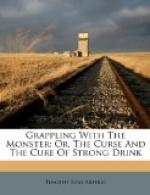either imported or home-made. I have heard men
say who had been extensively engaged in this
lumber trade, that Maine is not a dollar the
richer, and never was, on account of this immense
business; but that the people were poorer in consequence
of it, and more miserable than they would have
been if the pine forests had been swept away
by a great conflagration.
The effects of this course of trade were seen everywhere throughout the State. In scarcely any part of it was there any evidence of business prosperity or thrift, but, generally, there was abundant evidence of poverty, untidiness and decay. In the lumbering towns and villages, where the innumerable saw-mills were, the greatest bustle and activity prevailed. The air resounded with the loud noises coming from these mills. Night and day they were “run,” never ceasing until the “logs” were “worked up.” Relays of hands were employed at all these lumbering centres, so that the saw-mills never stopped even for an hour during “the season,” except for some occasional repairs. All these men drank rum; a quart a day per man was a moderate quantity; but a great many of them required two quarts a day. The result of this was, that the entire wages of the men were consumed in drink, except a meagre share that went to the miserable wives and children at home.
Everywhere throughout the State the results of this way of life was to be seen—in the general poverty of the people, and in the shabbiness of all their surroundings. But some persons conceived the idea that all this evil was not necessary and inevitable; that it came from the liquor traffic, which might be prohibited and suppressed, as lottery-tickets, gambling-houses and impure books and pictures had already been. And they devoted themselves constantly and industriously to the work of correcting the public opinion of the people as to the liquor traffic by demonstrating to them that this trade was in deadly hostility to every interest of the State, while no good came from it, nor could come from it, to State or people.
This educational work was carried on persistently for years; meetings were held by these persons in every little country-church and town-house, and in every little wayside school-house, where the farmers and their wives and children assembled at the call of these missionaries, to listen to their burning denunciation of the liquor traffic, which lived only by spreading poverty, pauperism, suffering, insanity, crime and premature death broadcast over the State. The result of this teaching was, that the public opinion of the State became thoroughly changed as to the character of the liquor traffic and its relation to the public prosperity and welfare.
When we thought the time had come for it, we demanded of the Legislature that the law of “license,” then upon the statute books, which represented the public opinion of the old time, should be changed for a law of prohibition,




